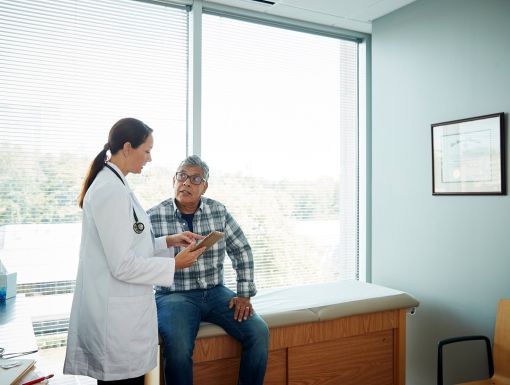
How Do I Navigate My Life After Prostate Cancer Treatment?
With advances in prostate cancer management, patients are living longer after treatment. In my practice, I routinely ask patients how well they cope with life after treatment.
Psychological support
Depending on the selected treatment for prostate cancer, patients may experience a variety of emotions: hope, anxiety, fear and sadness, to name a few. Treatment regret is common in patients who may not have anticipated living with the side effects of cancer treatment.Through a combined approach, negative feelings after cancer treatment can be relieved. I also encourage patients to engage family and friends who may have personal experience with treatment and offer valuable insight. I encourage patients to reach out to prostate cancer support groups as well. Education regarding the patient’s “new normal” is important to the success of any cancer survivorship treatment plan.
Diet and nutrition
After treatment, focus on maintaining a healthy lifestyle. Manage health conditions like high blood pressure, diabetes and heart disease. While there's no exact diet for prostate cancer survivors, adopting healthier habits can improve overall well-being and help minimize the effect of cancer on the body.
Urinary leakage
After treatment, urinary leakage can vary, with severe cases being uncommon (less than 5% of surgical patients). Some men may experience urine leakage during ejaculation. Increased frequency and urgency may lead to more restroom visits. We offer urinary pads and encourage pelvic floor exercises to strengthen muscles, often improving symptoms. If not, procedures like a urinary sling may help. Radiation therapy may not cause leakage but can lead to urgency, frequency, or slower bladder emptying. Scar tissue development may require further evaluation and treatment.Intimacy and sexual health
Some men have trouble with sexual performance before their treatment of prostate cancer, and for others, trouble starts after treatment. As a urologic surgeon, I recommend men try to have erections as often as they can, as regular sexual activity preserves erectile function and length. Men who are treated with surgery or radiation may experience erectile dysfunction. Men may have trouble getting an erection that is firm enough for penetration. Treatment for erectile dysfunction may involve oral medications, injections, vacuum erectile devices, or penile prosthesis implantation, particularly for patients with advanced cases not responding to other medicines.
Addressing a decrease in sexual drive involves identifying the root cause, such as depression or low testosterone levels. Depression can be managed with the help of a therapist, while intimacy issues can be addressed collaboratively with a sex therapist. Testosterone replacement therapy may be recommended for selected patients, although its use in prostate cancer survivors remains a subject of ongoing discussion and evolution in urologic oncology.
Surveillance
Lastly, cancer survivors need to stay in touch with their doctors and report any new symptoms for potential signs of recurrence. Monitoring for disease recurrence is a routine part of any cancer treatment plan. While the risk is low, exposure to radiation therapy may increase the risk for the development of secondary cancers such as bladder cancer, which can present as blood in the urine. Patients should be encouraged to ask questions and seek clarification regarding anything that is not clearly explained.
Learn more about urologist Omotola Ashorobi, MD.



